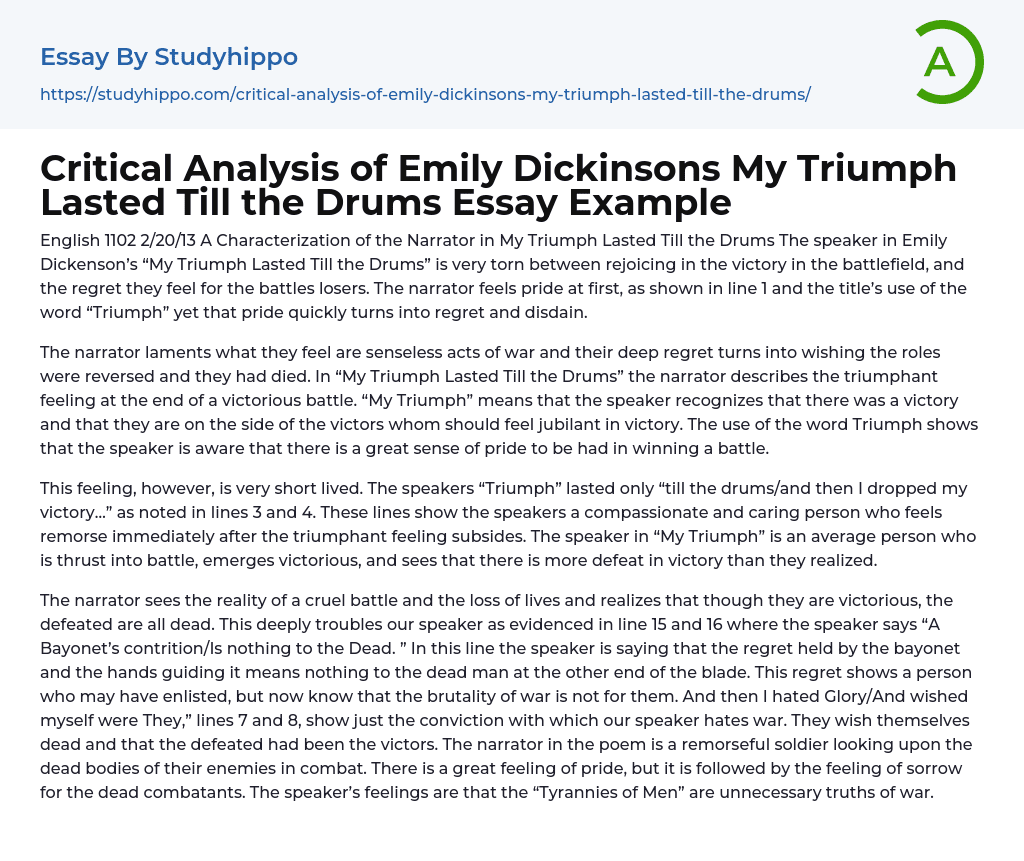

A Characterization of the Narrator in “My Triumph Lasted till the Drums” Essay Example
The speaker in Emily Dickenson’s “My Triumph Lasted Till the Drums” is very torn between rejoicing in the victory in the battlefield, and the regret they feel for the battles losers. The narrator feels pride at first, as shown in line 1 and the title’s use of the word “Triumph” yet that pride quickly turns into regret and disdain.
The narrator laments what they feel are senseless acts of war and their deep regret turns into wishing the roles were reversed and they had died. In “My Triumph Lasted Till the Drums” the narrator describes the triumphant feeling at the end of a victorious battle. “My Triumph” means that the speaker recognizes that there was a victory and that they are on the side of the victors whom should feel jubilant in victory. The use of the word Triumph show
...s that the speaker is aware that there is a great sense of pride to be had in winning a battle.
This feeling, however, is very short lived. The speakers “Triumph” lasted only “till the drums/and then I dropped my victory…” as noted in lines 3 and 4. These lines show the speakers a compassionate and caring person who feels remorse immediately after the triumphant feeling subsides. The speaker in “My Triumph” is an average person who is thrust into battle, emerges victorious, and sees that there is more defeat in victory than they realized.
The narrator sees the reality of a cruel battle and the loss of lives and realizes that though they are victorious, the defeated are all dead. This deeply troubles our speaker as evidenced in line 15 and 1
where the speaker says “A Bayonet’s contrition/Is nothing to the Dead. ” In this line the speaker is saying that the regret held by the bayonet and the hands guiding it means nothing to the dead man at the other end of the blade. This regret shows a person who may have enlisted, but now know that the brutality of war is not for them.
And then I hated Glory/And wished myself were They,” lines 7 and 8, show just the conviction with which our speaker hates war. They wish themselves dead and that the defeated had been the victors. The narrator in the poem is a remorseful soldier looking upon the dead bodies of their enemies in combat. There is a great feeling of pride, but it is followed by the feeling of sorrow for the dead combatants. The speaker’s feelings are that the “Tyrannies of Men” are unnecessary truths of war.
- Air Force essays
- Army essays
- Soldiers essays
- Army Values essays
- United States Army essays
- Veteran essays
- Aircraft essays
- Sergeant essays
- Auction essays
- Balanced Scorecard essays
- Battle essays
- Business Plans essays
- Expense essays
- Income essays
- Intranet essays
- Maintenance essays
- Net Income essays
- Security Guard essays
- Simulation essays
- Singapore Airlines essays
- Aldous Huxley essays
- Alice Walker essays
- Amy tan essays
- Anne Bradstreet essays
- Anton Chekhov essays
- Arthur Miller essays
- Augustine essays
- Bertolt Brecht essays
- Booker T Washington essays
- Carol ann duffy essays
- Charles Dickens essays
- Charlotte Perkins Gilman essays
- Chinua Achebe essays
- Christina Rossetti essays
- Consider The Lobster essays
- Edgar Allan Poe essays
- Elizabeth Bishop essays
- Emily Dickinson essays
- Ernest Hemingway essays
- F. Scott Fitzgerald essays
- George Orwell essays
- Harper Lee essays
- Homer essays
- James Baldwin essays
- Jane Austen essays
- John Donne essays
- John Steinbeck essays
- Kate Chopin essays
- Kurt Vonnegut essays
- Langston Hughes essays



